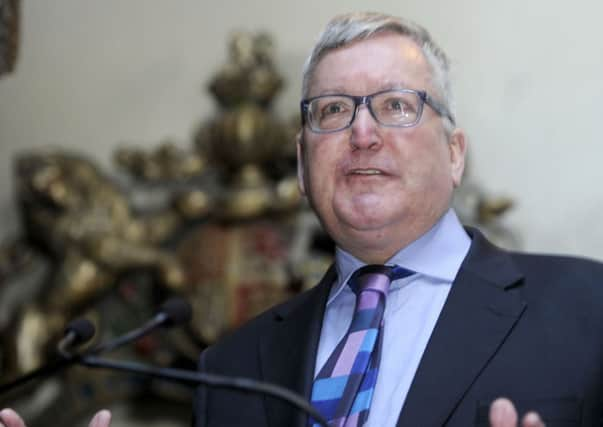Scottish Government defy Westminster over fracking


Proposals from the UK Department of Energy and Climate Change (DECC) will allow companies to drill for unconventional oil and gas below residential areas without first negotiating access rights.
The new powers will give automatic rights of access for firms to drill at depths of more than 300 metres.
Advertisement
Hide AdAdvertisement
Hide AdFergus Ewing said powers on this issue should be with Holyrood not Westminster so Scots would have the power to consider the issues over unconventional oil and gas in “an evidence-based, cautious and considered” way.
“All of the decisions taken about it should be taken by the people of Scotland, through the parliament and government they elected,” he said.
“UK Government proposals to remove the right of Scottish householders to object to drilling under their homes flies in the face of that approach and that is why we object to them. It is also fundamentally an issue affecting land ownership rights.
“The gung-ho approach of the UK government to the whole issue of unconventional oil and gas, often without any consultation with the Scottish Government at all, contrasts with our approach.”
Fracking, or hydraulic fracturing, is the controversial process of extracting gas and oil from shale rock by injecting a mixture of water and chemicals at high-pressure into boreholes drilled deep into the earth.
The technique would only be used at depths of 1.5km or more.
Environmental campaigners have welcomed the objection, which they say sends a “very clear message” to the fracking industry and “puts a spoke in the works” for the UK government’s drive to maximise the potential of unconventional oil and gas.
Friends of the Earth Scotland director Dr Richard Dixon said: “We are delighted that the Scottish Government is saying no to UK Government plans to remove people’s rights to stop, or even be notified about, shale gas fracking underneath their homes.
Advertisement
Hide AdAdvertisement
Hide Ad“The UK Government is falling over itself to get fracking going - all credit to Scottish ministers for having more respect for Scottish communities.
“The Scottish Government’s more cautious approach to unconventional gas extraction is good news for the people of Scotland and bad news for any operators hoping to make a quick buck before the shale bubble bursts.”
He added: “This is a very clear message to the fracking industry that Scotland is a place where it will be much harder to do business.”
Affected communities would receive a one-off £20,000 payment for each horizontal well of more than 200m in length.
A three-month consultation on the proposals was launched in May by Michael Fallon, the then business and energy minister for the UK.
He said: “These proposals allow shale and geothermal development while offering a fair deal for communities in return for underground access at depths so deep they will have no negative impact on landowners.”
The new Scottish Planning Policy announced in June contains five new measures relating to fracking – including the need for assurances that people and the environment can be protected, and operators being required to consult with communities on their proposals.
An independent review of scientific evidence on unconventional oil and gas was published last month. Commissioned by the Scottish Government, the report highlighted a number of issues that require further investigation. These included a further tightening of the regulatory process.
Advertisement
Hide AdAdvertisement
Hide Ad“Whatever your view on the issue of unconventional oil and gas – and it is clear that there are both opportunities and concerns - there is only one way that the people of Scotland can determine the approach in Scotland,” Mr Ewing added.
“That is to take the power to deal with this issue away from Westminster, and that can only be done with the powers of independence.“